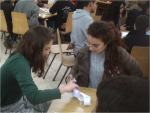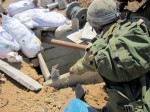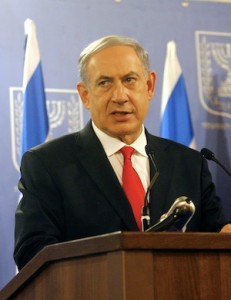The Pathways program pairs Arab and Jewish high schools for two-day experiential workshops about interest-based negotiation skills. (photo by Emily Singer)
As politicians debate about how to bring peace to the Middle East, or if it’s even possible, a newly formed nonprofit organization is bringing together hundreds of Jewish and Arab children across Israel every year and teaching them how to get along.
The Pathways program, directed by Avi Goldstein and facilitated by Michael Schnall, pairs Arab and Jewish high schools for two-day experiential workshops about interest-based negotiation skills. The program, sponsored by the U.S. embassy and run in partnership with school networks and community organizations, is based in large part on concepts from the international bestselling book Getting to Yes: Negotiating Agreement Without Giving In by Roger Fisher, William Ury and Bruce Patton (Penguin Books, 2011) and on methodology developed at the Program on Negotiation at Harvard Law School. Thanks to the initiative of the Darca network, the school where I teach, Shaked Darca on Kibbutz Sde Eliyahu, has had the tremendous privilege of participating in Pathways for the past two years.
The Pathways program combines a few goals, the most important of which would be difficult to say. Last year, when we received the invitation to apply to participate, I saw it as an exciting opportunity to expose my students to two intensive days of study and conversation in English. The entire program is in English, and this is a natural common language for communication among the Jewish and Arab students. But the program exposes the students to so much more.
With rich and varied activities, the students learn English as the international language of negotiation, conflict resolution and peace. They develop many new skills with one central message – in order to “win,” you don’t need for someone else to “lose.” When you listen to others and you are curious about their needs, instead of reaching a compromise, you can often reach agreements in which both sides walk away with a feeling of success.
And all of this takes place in a setting in which students have the opportunity to meet kids from a very different population and culture. Or maybe not so different.
The program opens with an activity designed to foster cooperation among the students, while emphasizing what they share. They are divided into mixed groups and given the task to build a paper chain made up of things everyone in the group has in common. Sound simple? Now try it with one hand behind your back. Literally. The students need to talk and plan together, and also to write, cut and paste, all with lots of cooperation, creativity, and even laughter.
Throughout the program, the kids are given situations in which they have to negotiate with each other. For example, a kid lends his friend his iPod. The next day, after the iPod is returned, he discovers that it doesn’t work and he wants his friend to buy him a new one. This is his “position.” But, before he goes into negotiation with his friend, he has to weigh a number of important issues. What does he think his friend is going to claim? Might there be any truth to it? How valuable is his friendship with this person? What is most important to him, and on what is he prepared to compromise?
There is a lot of discussion over the two days about “positions” versus “interests.” If each side comes to the table after serious consideration of what is really important to him or her (their “interests”) and curiosity about what the other party wants and needs, this leaves open the possibility for empathy as well as creative, outside-the-box thinking, and then the sky’s the limit.
The students are exposed to a wide variety of situations that must be negotiated, but none of them addresses the political conflict in which they live. They are able to make connections and compare shared values with students whom they might never otherwise meet, in a setting where the “sides” are mixed up, so they are not negotiating as Jews and Arabs, but rather “Table 1” against “Table 6,” “parent” versus “child,” or friend and friend.
The first day concludes with two powerful exercises. In one, the students are asked to divide into pairs, lock arms and “try to bring their partner’s arm down to the table as many times as possible.” The students proceed to arm wrestle. Mike, the program facilitator, asks why the students felt a need to struggle with their partner. “Did anyone notice that with cooperation, both players could arrive at much higher results?”
The final activity of Day 1 is an improvisational role play of a negotiation between a father and child. The child wants to go to a party and to come home late. Mike is the stubborn father who says, “By 10:30.” The part of the kid is played by students, who take turns volunteering. It begins with a classic negotiation of compromises. Midnight? No, 10:40. How about 11:30? No, 10:45. Whatever the outcome, someone will walk away disappointed. Until one student finally goes up to the stage and asks the Pathways magic word, “Why?” After a real conversation about interests, the boy understands that his father is worried about safety on the roads at night, and he’s feeling too tired to stay awake until his son arrives home safely. So, the boy suggests he stay overnight at his friend’s house and return home in the morning. Dad agrees. Everyone “wins” and walks away happy.
The second day begins similar to the first. After another ice-breaker, volunteers are invited to participate in a game. The kids are divided into two teams. There is a long rope, and each side has to pull the middle of the rope over the red line on their side as many times as possible. Rida, my Arab partner teacher, and I stand there watching in disbelief as the two sides struggle with all their might to “win.” Do they not remember the arm wrestling from the day before? Why are they not working together? But we learned from this and from many other activities that these skills are like muscles. Our habits and assumptions need to be understood and new skills need to be developed and exercised often. The good news is that they are relevant in every aspect of our lives – whether with friends, colleagues, family or business partners – so there is no shortage of opportunities to practise.
By the end of the second day, the students leave with a new language of negotiation – positions versus interests, options versus alternatives, communication, legitimacy, obligation and, of course, everything in English. They also leave thinking a bit differently about “the other,” with some students exchanging emails and telephone numbers.
Unfortunately, after the two days, the program ends and the students remain 45 minutes away, but worlds apart. This year, Pathways has begun new initiatives to build on the program for the future. To this end, I participated in Pathways’ Negotiation Education Teachers Fellowship, funded by the U.S. embassy, designed to bring together a community of teachers to integrate the learning of problem-solving negotiation skills into the English-language curriculum. We are also looking for ways to continue bringing the students together.
I feel incredibly blessed to be a part of the Pathways program and the rich community of Arab and Jewish English teachers in Israel who devote their lives to making the world a better place through education. I’m deeply grateful to the Darca network and to my school, Shaked Darca, for their support and their ongoing desire for innovation and alternative education. I also appreciate the contribution of the U.S. embassy, and Mike and Avi, who created Pathways and continue to keep it going, always thinking how the program can be improved and expanded. Most importantly, I am thankful to our fabulous students, mine and my partner teacher Rida’s, without whose open minds, open hearts and willingness to try new things and to dare to speak in English for two straight days, none of this would be possible.
Our children are truly our future. The more they know the language – and tools – of communication, cooperation and peace, the better our world will be. For more information on Pathways Institute for Negotiation Education, see pathwaysnegotiation.org.
Emily Singer is an English teacher and coordinator at Shaked Darca School on Kibbutz Sde Eliyahu in Israel. Singer taught at Vancouver Talmud Torah and her husband, Ross, was rabbi of Vancouver’s Shaarey Tefilah congregation until 2004.




